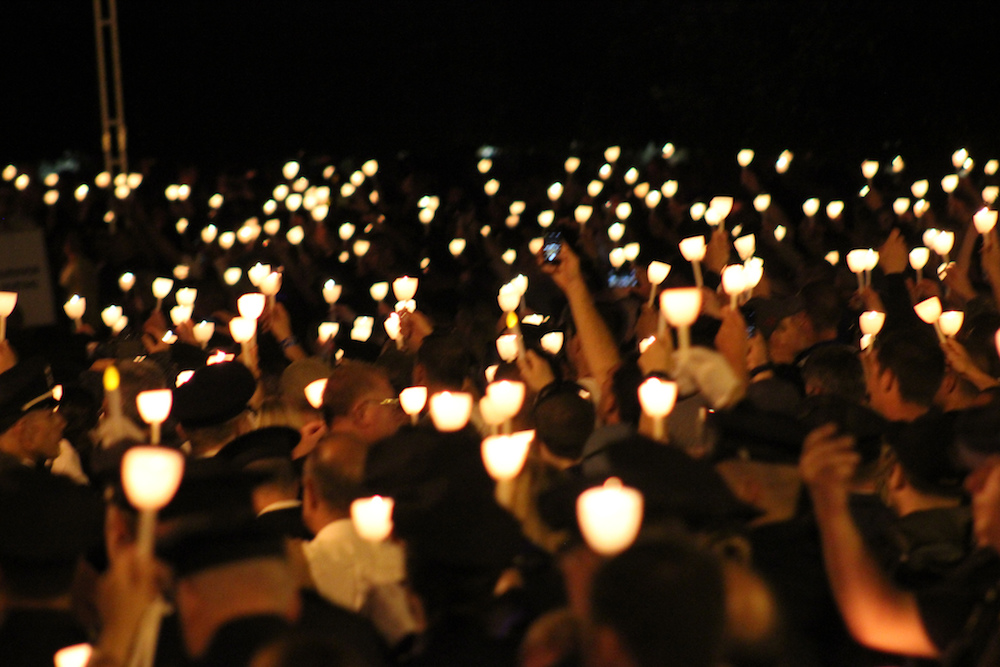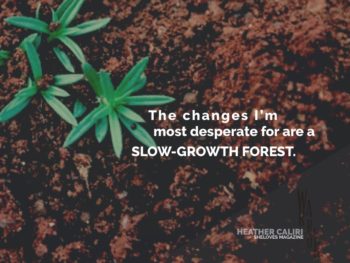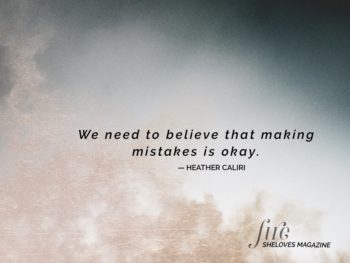
When I started asking social justice activists questions, I thought I’d feel awful when I compared myself to them.
If I talked with people who were walking the walk of serving the poor, of crossing cultural boundaries, of standing in the face of exploitation, of preaching reconciliation, I would be reminded over, and over at how piffling my own efforts were. Of how ordinary (read: useless) my own life was.
You with me? Even simply talking about, say, human trafficking makes you want to curl up and hide? Remembering at how lily-white your suburb is makes your stomach clench? And you think, there’s no use in me pretending I can do anything to change the world.
But for me, facing that anxiety brought good news. Spectacularly good news.
Because it underlined how people I admire—whose ideals and lifestyle are perhaps just slightly more aligned than mine are—are human. They aren’t experts—they’re simply further along a path that’s open to anyone. They don’t feel like they’ve arrived. They feel like they’re still learning, too.
In other words, the “experts” began as beginners, like anyone. And in a lot of ways, they are still beginners each morning.
So the best way to follow their lead is to get started with small steps.
After five interviews—most of which I approached with my knees knocking—I have a few baby steps to justice for the rest of us. (Like YOU and ME).
You ready?
1. Wake up.
The first step towards working to justice is simply noticing. Be awake and aware. Rachel Pieh Jones’ parents noticed their neighbors. Christena Cleveland’s parents noticed that their neighborhood wasn’t terribly diverse. Kelley Nikondeha had a conversation with a Burundian man at a conference.
I used to lament that my neighborhood wasn’t very diverse—and it isn’t exactly a rainbow coalition—but when I started looking, I noticed how many Latinos were sharing my parks, going to my husband’s soccer games, gathering at my church. I remembered how in high school I half-ignored, half-wondered about the Latino kids that shared the quad but not classes with me.
I noticed things like that when I lived in Houston: the odd divides between black and white in the line at the cafeteria and when worshipping at campus ministries. I noticed dividing lines in Argentina when we passed cartoneros or shantytowns.
If you live in privilege in this world, it’s easy to not notice. Waking up to uncomfortable realities costs something (not much, but something). Noticing isn’t enough on its own, but noticing is a first step to action. Once you notice, it’s harder to stay passive.
2. Be open.
I think this is the flip side of noticing. If you’re willing to notice, you’re halfway to the kind of soft heart that takes steps. But working towards justice also requires an openness to risk, to being rejected, to doing the wrong thing or changing how you live.
It also requires being open to take time. To keeping space in your schedule and life for new things to happen.
Kelley Nikondeha met someone at a conference, and was counseled by a mentor to be open to that brief meeting to develop into a friendship. Rachel Pieh Jones and her husband were open to living in a high rise filled with refugees. Saskia Wishart attended missions training.
I’m trying to cultivate that openness in my life. Having time to say yes to last-minute parties, friends over, childcare swaps, and conversations in the park has changed my life. Without time and openness for the unexpected, it’s hard for our lives to go in a new direction.
3. Focus on relationships.
This one is big for me. I used to think people who were involved in social justice just cared about the issues more than I did. I’d try to muster enthusiasm, but couldn’t make it stick.
But over and over, I’ve heard how only real friendships do anything to change our hearts. Kelley Nikondeha didn’t even know where Burundi was before she started a friendship with her now-husband. A bit of openness to a relationship with him, and she ended up adopting Burundian babies, marrying a Burundian, and working towards sustainable communities in that country. Christena Cleveland says that listening is the key to working towards reconciliation. Not good intentions, not book knowledge, not petition drives, but sitting down, looking into someone’s eyes, and hearing their story.
For me this is good news because new relationships are life-giving to me—while a petition drive would wear me out. I have a hard time mustering enthusiasm for faceless issues, but the more I form friendships, the more I start understanding and owning the issues my friends face.
4. Serendipity (or, cough, God’s hand) is key.
Over and over, people marveled at how a chance friendship, a trip taken without much forethought, or a friend’s invitation changed their lives. For Saskia Wishart, working against human trafficking started by following a boy across the world. DL Mayfield tagged along to a friend’s party. Kelley Nikondeha thought she might have a pen pal, not a husband.
I used to think I’d have to work my way up towards a useful life. That it would take a lot of effort, and time, and probably more know-how than I possessed.
But now, I’m seeing that my life’s work isn’t really up to me. If I’m open, if I’m aware, and I’m seeking to pursue relationships, most of the really important work will be done by God. He’ll find the right person to befriend. He’ll open the right door at just the right moment. He’ll give me the desire to learn more to be a better neighbor. I’m seeing that focusing on baby steps is just fine because always, any big steps will have to be taken by God.
5. Start where you are.
The people I talked to didn’t wake up one day and think, “I’m going to change the world today.”
No: perhaps their parents took a few small steps, and then as adults, they took one small step, and then another, and finally they were in a position where people said, “I could never do what you’re doing.”
I can imagine hearing that statement after a chain of baby steps must be tremendously frustrating.
Let’s get real: we all can do what they’re doing—in our own way, for our own circumstances. We can all take a baby step, open our eyes, reach out in friendship, look out for God’s big steps. We can start where we are and end up someplace unexpected.
6. Count the cost.
The first step doesn’t have to be earth-shattering, but even small steps will create push-back. You have to be prepared. Rachel Pieh Jones has to take a deep breath any time she leaves the house. Saskia Wishart admits that she might not have gotten involved in the abolition movement if she’d known what she knows now. Christena Cleveland pointed out that the privileged person in a ‘reconciling’ relationship bears none of the risk–and is thus exposing their new friend to risk.
In some way, though, this is good news for me. It makes me realize why even a small first step–striking up a conversation, setting foot in a new church, asking a hard question, being honest–feels so risky. It IS risky. Each small step is worth taking seriously, prayerfully, repentantly. It is worth committing time, effort, and thought. It must not be a throwaway.
I knew, going into these conversations, that pursuing justice in the world would require more of me than I could imagine. But I’m surprised to find that it also requires less than I expected. I learned that small things can be as life-changing as big showy gestures. That everyday courage has more currency than once-in-a-lifetime actions. I’m heartened that a life that’s useful and loving to my neighbor can start now.
And that’s exciting to me because of the last thing I learned:
6. It’s worth it.
Pursuing justice, forming friendships, listening to stories—these steps are healing for everyone. For the privileged and the oppressed. For the wealthy and the poor. The truth is all of us need redeeming in this world. And taking even one small step towards that redemption is life-giving beyond our wildest dreams.
Image credit: Karen Dalziel














Thanks Heather. This is a beautiful recap, thanks for the stirring questions and for making us dig deep into our journeys.
Heather, I’ve loved reading these conversations you’ve been having with such inspirational, world-changing women. You’ve certainly opened my eyes to a new perspective and made me think about my own interactions with people both globally and at home. Don’t stop!
Loved this summary Heather, and I was honoured to be a part of this series.
I especially appreciate this bit about relationships: “This one is big for me. I used to think people who were involved in social justice just cared about the issues more than I did. I’d try to muster enthusiasm, but couldn’t make it stick…” I feel like a lot of people battle that, trying to ‘muster’ the enthusiasm, when reality is, it is often the relationships that keep us going, whether or not we have the enthusiasm for what we do.
Love it, love you.
Xxx
I love this insight, Saskia–that the enthusiasm may not be there, and that’s okay. If we are knitted into community, into friendship, the others can give us energy to keep us going. Thanks for being here, friend.